Graduation Ceremony
Date: 16 July 2025
Time: 14:30
Venue: The Great Hall
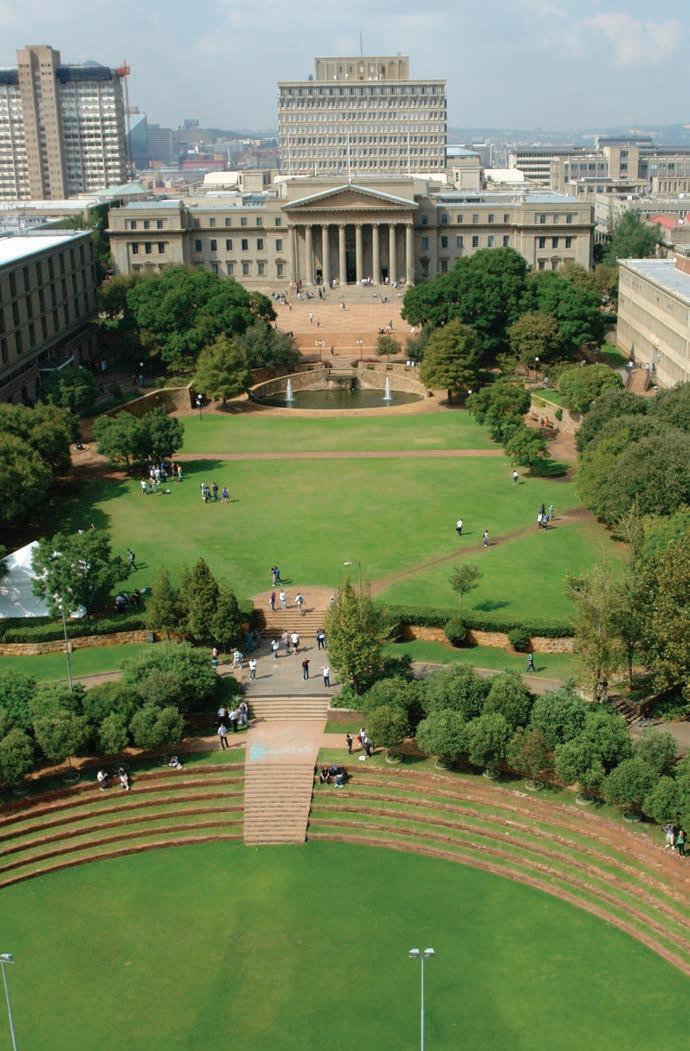

Date: 16 July 2025
Time: 14:30
Venue: The Great Hall


CONGRATULATIONS! HALALA!
GO LEAD SOUTH AFRICA TO GREATNESS!
A hearty congratulations to the class of 2025! Some of you are the first graduates in your family, well done! May your light shine for those who come after you! For those of you who are continuing in your family’s tradition, thanks for not dropping the ball. Education is the best self-investment. The past year changed the world as we know it, with no less than 60 countries and more than 1.3 billion people globally going to vote, including our own country. The outcomes have changed geopolitics, with the Global North becoming more internally focused. The resurgence of economic protectionism has altered trade landscapes, causing ripples across global markets. The rise of artificial intelligence and big data further reshapes the balance of power, as nations compete for supremacy in these fields. Climate change, a universal threat, has become a catalyst for geopolitical tension. The race for control over natural resources, especially in the Arctic and other vulnerable regions, has intensified. South Africa has not been spared in the regional conflict, losing our own young fighters for peace in the DRC.
As the twentieth meeting of the Group of 20 heads to our shores, a first for the continent of Africa, we have chosen Solidarity, Equality and Sustainability as our G20 theme. This speaks to our recognition of the interconnected of nations. Our shared future depends on mutual understanding, cooperation, equality and stability across nations. As our future leaders you need to adapt to an uncertain world, embrace diversity, and foster dialogue. That will help you to craft a healthier, more balanced world for future generations.
As you venture into the world, take time to expand the depth and breadth of your knowledge. Read outside your specialisation, engage with people outside your comfort zone. Understand the plight of people less fortunate than yourself. Be the change you want to see in your country first then the world. Leaders who leave footprints worth emulating, are not only the brightest but also those who take time to learn from others, who are accountable for their actions and omissions, who use what they know and what they have, to make the world a better place. Leaders who care. Those leaders do this consistently with Humility and Integrity, Always. May you be those leaders! HALALA!
CONGRATULATIONS! HALALA! GO LEAD SOUTH AFRICA TO GREATNESS!
Dr Judy Dlamini Chancellor
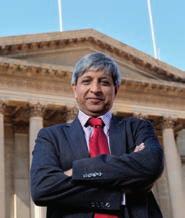
Dear Wits Graduate,

Congratulations on successfully completing your academic programme at the University of the Witwatersrand, the premier University on the continent.
You are now a member of an elite group of graduates of this august institution. More than 200 000 alumni at the cutting edge of excellence, both locally and internationally in business, the public sector, the academy, and in civil society have trodden this path.
Today, you become a member of this illustrious community.
Over the past 100 years, Wits has grown into one of the leading universities on the continent and a globally respected institution for its teaching and learning, knowledge creation and generation, and social impact. It has shaped the lives of many for the advancement of society. You are now an integral part of this proud and enduring legacy. Here at Wits, we actively pursue excellence and societal relevance in everything we do. From the abstract to the practical, our focus is on creating a space for the best thought, knowledge, and expertise to be unearthed and nurtured.
Wits is renowned for its intellectual leadership and for nurturing critical thinkers, creative innovators, problem-posers, and problem solvers. We have strived to match your ambition and drive to overcome the challenges thrown our way by the pandemic. Together we have reached the crest of the hill and proven, once again that excellence is achievable, even in times of uncertainty and adversity.
Your success has furthered our commitment to equipping the next generation of leaders with the skills and determination that you will need to find innovative and sustainable solutions to the pressing problems of the 21st Century.
As a Wits graduate, you had access to an exceptional educational experience. You have been exposed to a world-class academic and research programme and a vibrant community that makes you a true global citizen. You have been part of an institution that generates cutting-edge knowledge and innovation for South Africa and the world. It is now time for you to step into the world and use that experience, for good. We know that you will enter the next stage of your journey with the determination to build a better society tomorrow. I want to encourage you to remain a part of the Wits family by participating in our alumni programme and by further advancing the reputation of your alma mater.
Best wishes for the next steps of your journey and congratulations on being such a big part of the history of this illustrious institution.
Professor Zeblon Vilakazi, FRS Vice-Chancellor and Principal Wits University
Gaudeamus igitur
Juvenes dum sumus
Post jucundum juventutem
Post molestam senectutem
Nos habebit humus.
Ubi sunt qui ante nos
In mundo fuere?
Vadite ad superos
Transite in inferos
Hos si vis videre.
Vita nostra brevis est Brevi finietur.
Venit mors velociter
Rapit nos atrociter
Nemini parcetur.
Vivat academia
Vivant professores
Vivat membrum quodlibet
Vivat membra quaelibet
Semper sint in flore.
Vivant omnes virgines
Faciles, formosae.
Vivant et mulieres
Tenerae amabiles
Bonae laboriosae.
Vivant et republica et qui illam regit.
Vivat nostra civitas, Maecenatum caritas
Quae nos hic protegit.
Pereat tristitia, Pereant osores.
Pereat diabolus, Quivis antiburschius
Atque irrisores.
Let us rejoice therefore
While we are young.
After a pleasant youth
After a troublesome old age
The earth will have us.
Where are they
Who were in the world before us?
You may cross over to heaven
You may go to hell
If you wish to see them.
Our life is brief
It will be finished shortly.
Death comes quickly Atrociously, it snatches us away. No one is spared.
Long live the academy!
Long live the teachers!
Long live each male student!
Long live each female student!
May they always flourish!
Long live all maidens
Easy and beautiful!
Long live mature women also,
Tender and loveable
And full of good labor.
Long live the State
And the One who rules it!
Long live our City
And the charity of benefactors
Which protects us here!
Let sadness perish!
Let haters perish!
Let the devil perish!
Let whoever is against our school
Who laughs at it, perish!
Nkosi sikelel’ iAfrika
Maluphakanyisw’ uphondo lwayo,
Yizwa imithandazo yethu, Nkosi sikelela
Thina lusapho lwayo.
Morena boloka setjhaba sa heso, O fedise dintwa le matshwenyeho, O se boloke, O se boloke setjhaba sa heso, Setjhaba sa, South Afrika — South Afrika.
Uit die blou van onse hemel, Uit die diepte van ons see, Oor ons ewige gebergtes, Waar die kranse antwoord gee,
Sounds the call to come together, And united we shall stand, Let us live and strive for freedom In South Africa our land.
The Wits Choir
The Wits Choir has been around since 1995. Their repertoire is colourful and vibrant. They perform regularly at graduations and important ceremonies. The Wits Choir has toured internationally as well as playing host to other choirs here. They are also active in the community, undertaking choral outreach programmes.
16 JULY 2025 AT 14:30
The audience will rise as the academic procession enters the hall and will remain standing until the Vice-Chancellor is in place
The Vice-Chancellor will constitute the congregation
The Vice-Chancellor will welcome the graduands, diplomates and guests
Address to the congregation
Conferment of degrees and granting of diplomas
The Acting President of Convocation will address the graduates and diplomates
The Vice-Chancellor will dissolve the congregation
The audience will stand while Ihele is played
Members of the audience are requested to stand while the academic procession leaves the hall and not to leave the hall before the end of the ceremony.
In the event of load-shedding or power cuts, the Great Hall may become totally dark until the generator comes into operation.
DEAN: PROFESSOR
N CHETTY BSc Hons (Natal) MS PhD (U. Illinois Urbana -Champaign) MASSAf MSAIP MRSSA
ALEXANDER, Ryan Austin Computer Science DISSERTATION: Generalised task learning for robots: unifying task hierarchies through contrastive learning
ASSABIL, Joseph Junior eScience RESEARCH REPORT: Model performance optimisation in credit card fraud detection using class imbalance techniques, feature engineering and feature selection techniques
BALISA, Yamkela Statistics DISSERTATION: Optimising visual clarity using clustering techniques for overcrowded biplots
BALOYI, Trevor Medical Physics RESEARCH REPORT: Commissioning and implementation aspect of the Monaco TPS system at CMJAH
ESTERHUYSEN, Amir Yanir Michael (with Distinction)
Artificial Intelligence RESEARCH REPORT: Learning operators with NEAT for Boolean composition in reinforcement learning
FERNANDEZ, Jamie Ann
Molecular and Cell Biology DISSERTATION: Characterising the expression and transcriptional regulation of Peroxidasin and Peroxidasin-like in the lung during a Cytokine Storm
FLISHER, Khaleila Theresa
Molecular and Cell Biology DISSERTATION: Identifying the transcriptional regulators of PXDN in the kidney and determining the impact of genetic variation in PXDN and its transcriptional regulators in chronic kidney disease in a South African cohort
GAO, Jia Huai (with Distinction)
Molecular and Cell Biology DISSERTATION: Assessment of an inclined flat-plate bioreactor for culturing Bacillus thuringiensis strains
GOVENDER, Otisha Chemistry DISSERTATION: Conversion of Limonene to Carvone by oxidative biocatalysis
GQEBA, Sichumiso Zimi
Molecular and Cell Biology DISSERTATION: Evaluating PLGA encapsulated recombinant LRP as a treatment for cardiovascular disease
GUDAZI, Sunny Saneliso Mathematics DISSERTATION: Chromatic polynomials of some derived graphs
HLAHLA, Dimakatso Lauretta Economic Geology RESEARCH REPORT: Investigation of the ore mineralisation styles and alteration zones of Messina copper deposits, South Africa
HLOMUKA, Jackie Environmental Sciences RESEARCH REPORT: Improving solid waste management in a coal mining organization: a case of Mafube coal
HURWITZ, Jessica Sarah (with Distinction)
Molecular and Cell Biology DISSERTATION: Investigation into the molecular interaction between forkhead box P3 (FOXP3) and vitamin D receptor (VDR)
IKKING, Keenan (with Distinction)
Molecular and Cell Biology DISSERTATION: Evaluation and application of tools for mRNA isoform detection using nanopore sequencing data
KASSIM, Shawal
Computational and Applied Mathematics DISSERTATION: A computational review of the maximum clique problem: classical vs. quantum
KGOMO, Thapelo Animal, Plant and Environmental Sciences DISSERTATION: Habitat, plant communities and threats to the Robertson Granite Renosterveld
KONI, Mwezi (with Distinction) Physics DISSERTATION: Photonic circuits with light patterns
LETSELA, Kopano Lazarus Statistics DISSERTATION: Geographically weighted statistical machine learning methods for predicting net primary productivity in the Eastern Sahel Region
LUND, Erin Shawn (with Distinction) Palaeontology DISSERTATION: Redescription and new material of the Triassic cynodont Cistecynodon parvus and reassessment of its phylogeny
MABUZA, Angel Mathematics DISSERTATION: Products of tensors
MADIBA, Nthabiseng Pebetse Environmental Sciences RESEARCH REPORT: The role of practitioners in facilitating the public participation process: a review of EIA in renewable energy projects
MAKUWA, Nicolene Nyarai Hydrogeology RESEARCH REPORT: Assessment of the impacts of agricultural activities on surface water and groundwater quality: a case study in the Brits area, North-West Province, South Africa
MALELU, Liseloane Lucy Geology DISSERTATION: Geochemical and geochronological analysis of post-impact hydrothermal alteration in the Morokweng impact structure, South Africa
MAPHUTHA, Mmatolo Julliet Palaeontology DISSERTATION: Reconstruction of the early-middle miocene palaeoenvironment in Gorongosa National Park, Mozambique
MATA, Abonga Geography, Archaeology and Environmental Studies DISSERTATION: Evaluating the use of mid infrared spectroscopy in predicting soil carbon, nitrogen contents, and soil texture in varying South African soil samples
MATAFENI, Gcobisile (with Distinction) Computer Science DISSERTATION: The effects of node removal on Bayesian network resilience for ATM network transaction vulnerabilities
MATLHAGA, Fonda Ricardo (with Distinction) Palaeontology DISSERTATION: Two new basal anomodont specimens from the lower Abrahamskraal formation (Beaufort Group: Karoo Supergroup) - implications for anomodont phylogeny and palaeoecology
MATSHA, Aviwe (with Distinction) Molecular and Cell Biology DISSERTATION: Investigating the foraging behaviour of entomopathogenic nematodes cultured in vitro
MBATHA, Bonginkosi Wiseman Geophysics DISSERTATION: Seismic analysis of the onshore Mozambique basin reservoirs, Inhassoro area
MMOTONG, Juliet Ramathabathe Environmental Sciences RESEARCH REPORT: Factors affecting compliance of wastewater management: a study on waste water systems operations in the City of Tshwane, Gauteng
MOKGOSI, Dimakatso Rachael Chemistry DISSERTATION: Development of a quantitative method for the analysis of zinc in various ores by spectroscopy
MOKOKA, Oboikanyo Austin (with Distinction)
Molecular and Cell Biology DISSERTATION: Analyses of cassava phytohormones in biotic responses during South African cassava mosaic virus infection
MOOA, Phuthanang Faith Geology DISSERTATION: Petrographic, whole-rock geochemical and δ34S isotope characterisation of the Middelvlei Reef in the Witwatersrand Basin
MORRISON, Caitlin Audrey (with Distinction) Chemistry DISSERTATION: The structure study of low-temperature rhombohedral bismuth oxide-based electrolytes
MOTSEKI, Masupha David
Medical Physics RESEARCH REPORT: Commissioning and evaluation of electron Monte Carlo dose calculation algorithm in the Monaco treatment planning system
MPHUTI, Thabiso Isaac Chemistry DISSERTATION: The preparation of pyridylimine MN(I) and RU(II) complexes as catalyst precursors in formic acid dehydrogenation
MUGHOGHO, Ruth Ntombihle Interdisciplinary Global Change Studies RESEARCH REPORT: Exploring the extent of youth participation in disaster risk reduction in Blantyre, Malawi
NAIDOO, Kavisha (with Distinction)
Molecular and Cell Biology DISSERTATION: Agricultural pest management: identification, characterisation, and stress tolerance of entomopathogenic nematodes
NAIDOO, Kiara Alexi
Molecular and Cell Biology DISSERTATION: Immunomodulatory effects of vitamin D on TLR7 and TLR8 signalling in monocytes and monocyte-derived macrophages
NOEL, Keanu Mikhail
Computer Science DISSERTATION: A Bayesian approach to maximise photovoltaic system output
NYEMBEZI, Linda Kim
Animal, Plant and Environmental Sciences DISSERTATION: Spatiotemporal dynamics of Afrotemperate forests in KwaZulu-Natal, South Africa
NZIMELA, Yola Siyamthanda (with Distinction) Archaeology DISSERTATION: Engaging collections: Libetshu in the Nicolaas Jacobus Van Warmelo collection, Ditsong National Museum of cultural history, South Africa.
NZUZA, Wandile Siyamthanda Physics DISSERTATION: What are B-jets and what can we do with them?
PERIKLI, Nicholas Physics DISSERTATION: Alert signal classification and prediction using natural language processing for the tile calorimeter of atlas
PILLAY, Christopher Wayne (with Distinction)
Computer Science DISSERTATION: Cross-domain few-shot classification for remote sensing imagery
PURSOOTH, Takshita Environmental Sciences RESEARCH REPORT: Comprehensive contributions of the informal sectors in solid waste management systems: a case study of Central Johannesburg
RAMANYIMI, Mukundi (with Distinction) Physics DISSERTATION: Archiving visibility data using lossy baseline-dependent SVD techniques
RAMMUTLOA, Katlego Lucas Data Science RESEARCH REPORT: Causal inference in water distribution networks to quantify the effects of network damage
RANGATA, Mmantheka Patricia (with Distinction) Chemistry DISSERTATION: Method development for the quantification of rare earth elements in South African monazite by various spectroscopic techniques
RANOTO, Tumelo (with Distinction) Mathematics DISSERTATION: A study of the second-order dynamical systems for variational inequalities
ROETGER, Victoria Charlotte (with Distinction) Animal, Plant and Environmental Sciences DISSERTATION: Plant-pollinator networks along an altitudinal gradient in the Drakensberg Mountain Centre-implications for climate change
SAVRIMUTHU, Charét Arianna (with Distinction)
Molecular and Cell Biology DISSERTATION: Pan-genome analysis of pantoea agglomerans strains to investigate their ecological and functional diversity
SIHLALI, Cebisa Nandipa Geography, Archaeology and Environmental Studies DISSERTATION: The impacts of the fifth industrial revolution on employment in the gold mining sector in South Africa
SITHOLE, Basani
Chemistry DISSERTATION: A study on the kinetics of Iridium sponge dissolution
THUNGANA, Yonela Innocentia
Geographical Information Systems and Remote Sensing RESEARCH REPORT: Exploration of high-resolution multispectral UAV imagery for non-destructive estimation of chlorophyll content in lemon leaves
TSHIPAMBA, Ester Keeyanda (with Distinction)
Molecular and Cell Biology DISSERTATION: Unravelling the connection between Hypercholesterolemia and Alzheimer's Disease: insights into oxidative stress and signalling pathways
TWALA, Enele (with Distinction) Palaeontology DISSERTATION: Cranial asymmetry and inner ear evolution in extant owls and comparative bird species
VAN WYK, Lize-Marie (with Distinction)
Molecular and Cell Biology DISSERTATION: Mechanistic insights into cholesterol depletion in an in vivo model of pancreatic cancer
WASINDA, Janet Julius
Molecular and Cell Biology DISSERTATION: Monocyte-to-macrophage differentiation with 1,25-dihydroxyvitamin D3 potentially enhances macrophage polarisation and function in THP-1 cells
WILLIAMS, Peter (with Distinction) Mathematics DISSERTATION: On derivations of group algebras
ZIMBA, Kabelo Micheal Chemistry DISSERTATION: A biocatalytic approach for the synthesis of known antitubercular and antischistosomal compounds
BENTLEY, Abigail Environmental Studies
DEOSARAN, Shaneek Genetics and Developmental Biology
DUBE, Victor Mpumelelo Mathematical Statistics
JAMBO, Don Microbiology and Biotechnology
KARUPPEN, Kaylyn Computer Science
LEKALAKALA, Vanessah Chemistry
LEKHULENI, Basile Mmatebogo Environmental Studies
MAAKO, Cathy Physics
MABUNDA, Darius Geology
MACHWEU, Mavis Thato Animal, Plant and Environmental Sciences
MALELE, Risuna Clementine Computational and Applied Mathematics
MALINGA, Nobukhosi Fortunate Animal, Plant and Environmental Sciences
MASEKO, Lerato Animal, Plant and Environmental Sciences
MHLONGO, Siyabonga Mathematics
MICHAEL, Kereshlin Computer Science
MOKETA, Lereko (with Distinction) Geographic Information System and Remote Sensing
MOKGAKO, Katlego Junior Microbiology and Biotechnology
MOKOBODI, Precianti (with Distinction) Mathematics
MOKOKO, Kananelo Onalerona Mathematics
MOLEFE, Lesego Palesa Environmental Studies
MORUDU, Lucy Rela Chemistry
MOTHIBI, Karabo Geography
MUGODO, Funanani Bruce Mathematical Sciences
NEMUNZHELE, Okhwathisa (with Distinction) Mathematics
NKOSI, Naledi Nomzamo Geographic Information System and Remote Sensing
NKUTSHWEU, Goitseone Kelly (with Distinction) Mathematics
NYAKANE, Noxolo Hermione Environmental Studies
PATEL, Kirti Sanjaykumar (with Distinction) Computer Science
PILUSA, Ripfumelo Lusilly (with Distinction) Computational and Applied Mathematics
RASIKHANYA, Wendy Animal, Plant and Environmental Sciences
RASMENI, Sinovuyo Applied Bioinformatics
THWALA, Ayanda Blessing Computer Science
AHMED, Ahmed Mohamed Abaker
ALI, Yassir Awad Mohamed Elballa
BIYELA, Sabelo
BOSHOFF, Carreyann Lisa
CHEPAPE, Itumeleng
CHINDUNDU, Daphne
DE BEER, Nandi Beyonce
DUPWA, Tendai Lancelot
KAMA, Ntsikelelo
KHOSANA, Seolebaleng Keneilwe
KHUMALO, Sibongile
KUBHEKA, Amani Julia
LEPHOTO, Kamohelo Banele
MABHENA, Shekinah Samukelisiwe
MABIJA, Kharendwe
MAHLARE, Keamogetse Gosiame Gweneth
MAKANETE, Simon Karabo
MAKATU, Farelanani Tshwaranang
MASANGO, Nqobile
MATANDELA, Afika Amahle
MAZIBENI, Buhle Nicole Nyiko
MBATHA, Aphiwe Nkululeko
MEHLWANA, Bhekizenzo
MNYADI, Sphindile Temperance
MOKOENA, Teboho Maurice
MOLLO, Vuyisile Jenat
MOLOTO, Mamoloko Jo-Anne
MPOLOKENG, Kgothatso
MTHETHWA, Palesa
MTSWENI, Sinenhlanhla Simon
MTULE, Sabani
MUKWEVHO, Takalane Leanne
NDZELU, Blessing Buntu
NETSHIOZWI, Natalie Muthathedzwa
NGWENYA, Karabo
NKHOMA, Sinethemba Nomonde Mahalia
NKOMO, Trixie Tapiwa
NKUNA, Lulama
NTULI, Nontando Andiswa
NZONDA, Katlego Reneilwe
PATEL, Caitlyn Angelique
PHAKATHI, Xolelwa
RAPELEGO, Koena
RAPOLAKI, Palesa Monica
RASENYALO, Simphiwe
RASIKHANYA, Wendy
RORKE, Kate-Lynn Sasha
SANGWENI, Mbali Happyness
SEBETOANE, Palesa
SENNE, Thoriso Boitumelo Bridget
SETSIBA, Lerato Malose
Postgraduate Diploma in Science
ATIF, Iqra (with Distinction)
KEKANA, Mmanate Gloria
KHAMBULE, Nomusa Hope (with Distinction)
LEKETA, Motselisi Alexandra (with Distinction)
MABUZA, Sanele Generations
MAHBOOB, Muhammad Ahsan (with Distinction)
MANCOBA, Kanyisa (with Distinction)
SHABALALA, Godwill Ntsako
SHANGASE, Mongezi Lusanda
SHONGWE, Lusanda Mayenziwe
SIBIYA, Tinyiko
SIGAMONEY, Joshua Tyreece
SITHOLE, Siphelele
SLINGSBY, Hedya Mapule
SUPING, Jane Phuzile
THOBELA, Fortune Mpendulo
TSHINKUNKU, Sarah
TSIRWE, Motheo
VILAKAZI, Mduduzi Given
Data Science
Data Science
Innovation and Entrepreneurship
Data Science
Data Science
Innovation and Entrepreneurship
Data Science
Prizes to be presented at the Faculty’s prize giving ceremony
Biochemistry and Cell Biology Top Achiever Award:
This prize is awarded annually to the most distinguished Master of Science student in Biochemistry and Cell Biology in the School of Molecular and Cell Biology.
Kiara Alexi Naidoo
Inqaba Biotec:
This prize of is awarded annually to the most distinguished Genetics and Developmental Biology MSc student in the School of Molecular and Cell Biology. Keenan Ikking
Molecular and Cell Biology Teaching Assistant Award:
This prize is awarded annually to a Teaching Assistant who has provided consistent and outstanding service to undergraduate students and to the School of Molecular and Cell Biology. Oboikanyo Austin Mokoka
Chancellor
DR NJ DLAMINI MBChB (Natal) DOH (Free State) MBA (Witwatersrand) DBL (Unisa) PGCE (Witwatersrand) IEC (Stanford-USA)
Vice-Chancellor and Principal
PROFESSOR Z VILAKAZI BSc (Manchester) MSc PhD (Witwatersrand) FRS, FAAS, MASSAf
Chairman of Council
MR I SHONGWE BA (Wesleyan) MPhil (Oxford)
Senior Deputy Vice-Chancellor (Academic)
PROFESSOR R OSMAN BA (Witwatersrand) HDipEd BEd (Unisa) MEd PhD (Witwatersrand) MASSAf
Deputy Vice-Chancellor (Research and Innovation)
PROFESSOR L MORRIS BSc (Hons) (Witwatersrand) DPhil (Oxford) FRSSA FAAS MASSAf
Deputy Vice-Chancellor (Systems and Operations)
PROFESSOR IR JANDRELL BSc(Eng) GDE PhD (Witwatersrand) IntPE(SA) PrEng FSAAE FSAIEE SMIEEE
Deputy Vice-Chancellor (People Development and Culture)
PROFESSOR G STEVENS BA (Cape Town) BA (Hons) Psych MPsych (Western Cape) DLitt et Phil (UNISA), MASSAf
Registrar
MS CG CROSLEY BA HDipEd (Witwatersrand) BEd Hons (Unisa) MEd (Witwatersrand)
Chief Financial Officer
MS MM MANYAMA CA (SA) BCom Accounting (Cape Town) BCompt Hons (Unisa) BCom Hons Taxation (Pretoria) MBA (GIBS)
Dean of Student Affairs
MR JAP SEPTEMBER BA MPhil (Cape Town)
DEANS OF THE FACULTIES
Faculty of Commerce, Law and Management
PROFESSOR J COHEN BCom Hons PhD (Witwatersrand)
Faculty of Engineering and the Built Environment
PROFESSOR T MAJOZI BSc(Eng) MSc(Eng) (Natal) PhD (UMIST) CEng PrEng FIChemE FAAS MASSAf FWISA FSAAE
Faculty of Health Sciences
PROFESSOR SA MADHI MBBCh MMed PhD (Witwatersrand) FCPaeds(SA) MASSAf RSSAf TWAS CBE
Faculty of Humanities
PROFESSOR M MUSEMWA BA Hons (Zimbabwe) MA (Cape Town) PhD (Minnesota, USA) MASSAf
Faculty of Science
PROFESSOR N CHETTY BSc Hons (Natal) MS PhD (U. Illinois Urbana-Champaign) MASSAf MSAIP MRSSA
President of Convocation
MS K MUFAMADI BA LLB LLM (Witwatersrand)
The mission of the Faculty of Science is to graduate excellent students who are equipped to make a meaningful contribution broadly to society and are ready to undertake postgraduate studies at Wits or any other top university in the world. A hallmark of our graduates is their independent, critical, creative and entrepreneurial thinking in the sciences, and a commitment to make this world a better place for all.
We strongly encourage you to continue your studies as a postgraduate student in the Faculty. We offer excellent postgraduate coursework and research programmes in a range of diverse areas from Astronomy to Zoology. The MSc in Science Communication, the PGDip in Data Science and the PGDip in Innovation offer very new avenues for postgraduate training and valuable skills development. The Faculty of Science is home to three out of the seven DSI/NRF funded Centres of Excellence at Wits, known for their cutting-edge research in their respective focus areas. In addition, the Faculty has been chosen as the lead institution by the Department of Science and Innovation to host the National eScience Postgraduate Teaching and Training Platform in the data sciences. The Faculty of Science is also home to the Wits Anglo American Digital Dome, and the Wits Sterkfontein Caves.
Academic staff in the Faculty collaborate with leading universities and laboratories around the world. Many of our postgraduate students spend time in overseas institutions as part of their postgraduate degrees and participate in national and international conferences. Our researchers are active participants in some of the large global science experiments such as at CERN and the SKA, and publish their work in some of the best international journals.
Wits is committed to maintaining its standing as a leading internationally renowned university producing work that is visible to the entire world, and positively impactful on the ways in which we live our lives in the 21 st century. I hope you will join us in this exciting endeavour!
Nithaya Chetty Dean: Faculty of Science
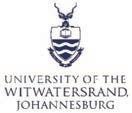
1. In the event of an emergency and/or fire:
The presiding official (Chancellor/Vice-Chancellor/Deputy Vice-Chancellor) will make an announcement requesting guests, graduands and staff to keep calm and remain seated; The Ushers will assist guests to proceed to the nearest Emergency exits in order to evacuate the Great Hall in an orderly fashion; Emergency exit signs are visible in red above all exit doors situated on your left and right hand sides as well as the back of the Hall;
The Ushers will assist the elderly and disabled guests out of the building; The academic procession on stage must exit through the back stage door; Once outside the Great Hall all guests, graduands and staff must proceed to the main assembly point on the piazza.
2. In the event of a Bomb threat
All bomb threats will be treated as real in order to protect lives and property and the premises will be evacuated immediately.

Dear Wits Graduate,
There are a few defining moments in life – and it is without doubt that graduation is one of them!
Today, you enter the world as a graduate from one of the top universities on the African continent. You enter into a world filled with many challenges, but a world that is also filled with limitless possibilities. May you meet all the challenges and opportunities that await you with pride, drive, passion, innovation, social-conscience and positive-purpose.
In addition to earning the degree conferred upon you today, you have also earned the right to be associated with a special group of individuals – the Convocation of Wits University. Convocation represents all the degreed graduates of Wits and forms a vital link between the University and the global community in which it operates. Membership to Convocation is free and serves as an official channel, allowing you, the members, to convey to the University management your views about the University. This membership comes with several unique privileges, which include nominating the Chancellor of the University. The Convocation Executive has two members on the Wits Council (the governing body of the University) and maintains other regular contact with the University to ensure the voice of the Convocation is represented at the highest levels of The University.
There are approximately 250 000 Wits alumni worldwide. The distinction of our university is important to the prestige of our collective qualifications. We call upon you to nurture and enhance the value of your degree by promoting Wits’ image, preserving our values, and contributing towards our ongoing development, ensuring that we grow in stature as a globally competitive, proudly South African institution of higher learning. Please engage with us via our numerous social media channels and keep connected with us so you can access career support, receive invitations to events and reunions and have sight of all the latest news about Wits and prominent Witsies: www.wits.ac.za/alumni/updateyourdetails/
I would like to extend a warm welcome to you – you are now a #Witsie4Life!
Ms Kgomotso Mufamadi President of Convocation Wits University

Convocation is a statutory body that includes all graduates of the University. Convocation is the largest constituency of the University (since the founding of the University in 1922, graduates number over 200 000). Its statutory mandate is to “… discuss and state its opinion upon any matters relating to the University including matters referred to it by the Council” and allows for the views of graduates to be represented at the highest levels of governance of the University.
Words and music by S.B.P. Mnomiya
Anhom
Falalala
Obani labo?
Baphi Ahhom?
Ngibona beza
Beyikazela
Bathwel ‘ongiyane
Bavela kuphi na?
Obani labo?
Ongqondongqondo
Osibakhulu
Yibo labo hhom!
Yini na leyo?
Ihele
Ihele lezingwazi zakithi
Ahhom udwendwe
Ahhom
Udwendwe lwezingqwele zakithi
Nant’ ihele
Longqondongqondo
Nant’ ihele
Losibakhulu
Udwendwe
Udwendwe Iwezingqwele zakithi
Who are those? Which, Falalala?
I see them coming
Walking with swinging garments
They are wearing head rings
Where do they come from?
Who are those?
They are people with knowledge
They are people in authority
These are the ones
What is that?
It is a procession
A procession of our heroes
It is a procession
A procession of our champions
Here is a procession
Of people of knowledge
Here is a procession
Of people of knowledge
A procession
A procession of our heroes
Ihele is known as the ‘Black’ Gaudeamus Igitur. In song, the writer, Mnomiya uses very poetic language to describe a graduation ceremony. The soloist sings of the ‘strange’ procession of people in long robes and head gear. The choir responds by saying that these people are academics who read profound books of knowledge.
Mnomiya goes on to say that the graduates are an inspiration to all of us, and we will also graduate like them one day. The song goes on to wish the graduates well and it ends with a resounding “Halala” (well done!).
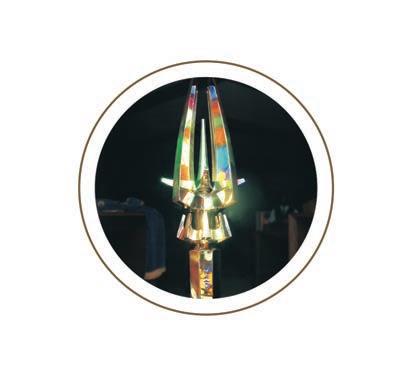
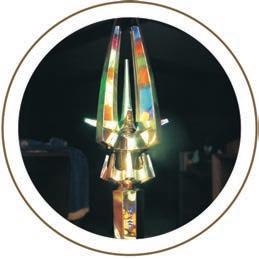
Maces were originally weapons of defence, designed to break through armour. In medieval times, bishops carried a mace instead of a sword into battle to enable them to defend themselves in accordance with the canonical rule that forbade a priest to shed blood. In time, the mace has come to be regarded as a symbol of delegated authority vested in a person or an institution. At this University, it is a symbol of the authority vested in the Chancellor and a reminder of the mandate given by the legislature of this country to the University to grant degrees.
The University mace is the work of the Edinburgh designer, silversmith and engraver, William Kirk, who designed and made the mace of the University of Stirling and of other institutions. It is silver-and gold-plated, is 1070 millimetres long and 180 millimetres broad and weighs seven kilograms. The heraldic devices used in the decoration reflect the character of this University as an institution of learning, set in a mining centre within the Republic of South Africa.
The head of the mace with its spreading vertical blades is symbolic of the horns of a springbok. The central vertical spike is representative of a rock drill on the mine, and the amber stone set in the head is intended as a tribute to a past Chancellor through its association with his name, Bernstein, which in German means amber stone. The heavy quality of the head is consistent with the traditional concept of the mace as a weapon of defence. The collar repeats the shape of the head. It consists of eight cogs which symbolise the cog-wheel in the University coat of arms and represents mining and industry. The shaft is octagonal and divided into three sections. The coat of arms of the University is placed on the shaft under the collar. Below this the words Universitas Witwatersrandensis Johannesburgi: are inscribed, followed by the date in Roman numerals – MCMLXXVI (1977) – which signifies the year of the dedication of the mace.
The mace is a symbolic portrayal of this University, this city, the Witwatersrand and the Republic of South Africa. It is a constant reminder to members of Council and Senate to uphold at all times the rights, powers and privileges of the University and its governing bodies.
The academic dress of this University is patterned on that of the Universities of Oxford and Cambridge, with modifications based on the model of the University of London and certain individual features, particularly in the costumes of office bearers and the hoods of degreesof bachelor and master.
Dress for Office Bearers
• The Chancellor wears a scarlet silk gown with a broad facing of black velvet down each side, embroidered in gold and a black velvet cap with gold cord and tassels.
• The Vice-Chancellor and Principal wears a blue silk gown with a broad facing of gold silk down each side, embroidered in blue, the sleeves being lined with gold silk. The cap is of the same design as that of the Chancellor.
• The Chairman of Council wears a black silk gown with a broad facing of red velvet down each side and around the neck, the sleeves being lined with gold silk. The cap is of the same design as that of the Chancellor.
• The academic dress of the Deputy Vice-Chancellors and the Executive Directors is the same as that of the Vice-Chancellor and Principal, except that the colour of the facing and sleeves of the gown and of the cord and tassels of the cap is silver-grey.
• The gown of the President of Convocation is of blue silk, with a broad facing of gold silk down each side, the sleeves being lined with white silk. The cap is the same as that of the Chancellor, but with a blue cord and tassels.
• The Registrar wears a black silk gown with a broad facing of blue silk down each side, bordered with gold braid. The cap is the same as that of the President of Convocation.
• A member of Council wears a black silk gown with a broad facing of gold silk. The cap is the same as that of the Chancellor.
• The gown of the President of the Students’ Representative Council is black with a broad facing of blue satin.
Graduands’ Gowns
• The gowns for all degrees of bachelor and master of the University are black, of the same pattern as the gown for a Master of Arts at the University of Oxford.
• The gown for the degree of Doctor of Philosophy is scarlet, after the University of London pattern.
• The gown for a senior doctorate is the same as that for the PhD, but with a gold satin facing on each side of the gown and with the sleeve button and cord in gold.
The Academic Hood
The academic hood is the principal feature of the costume for holders of our degrees of bachelor and master. The hood for the PhD is standard, regardless of the Faculty in which the degree was obtained. It is scarlet silk, lined with white silk.
Degree Colours
The hoods reflect the colour or colours of a particular degree or associated degrees.
As a 102-year-old public university in South Africa, Wits is proud of its record of achievement as a significant contributor to our society. We contribute capable people to society that are training in their chosen field that are engaged and able to tackle problems using evidence-based solutions. We also engage with our communities to share knowledge that we create so as to make a positive impact on the quality of life. Wits for Good.
Wits is a world-class research-intensive university based on our intellectual excellence, international competitiveness, and commitment to social justice; all of which have a measurable impact.
Here are a few of many differentiators:
• An international perspective that helps us maintain high standards in teaching and learning and research while not distracting us from our place in Johannesburg, South Africa, and Africa. In 2024 Wits authors published articles with co-authors from 199 universities, 94% of which were from countries other than South Africa.
• An intellectual hub of Africa, a founding member of the African Research University Alliance. In 2024 Wits published 2 342 articles with co-authors in Africa, including 32 articles with Namibia, 61 with Botswana, 87 with Zimbabwe and 36 with Mozambique.
• An active and engaged community leader that takes a stand on social issues and is fully committed to the advancement of the public good.
• A growing contribution to the body of knowledge through peer reviewed academic publications: 4 563 in 2024 and an average growth rate of 4% per year over the last five years.
• Knowledge contribution that is above global quality averages in several fields including: clinical and pre-clinical health studies (76% above global norms); arts and humanities (58% above global norms); life sciences (36% above global norms); physical sciences (12% above global norms).
• Wits is particularly associated with the study of the fields of virology, particle physics and the Higgs Boson, malaria, archaeology, paleontology, paleoanthropology, violence, local and regional politics, geochemistry, rock mechanics, deep mining, forensic anthropology, climate change, migration, social justice, and many more.
• Proud of the four Nobel laureates and the 99 Rhodes Scholars.
• Proud of our current 42 000 students of whom 16 600 (40%) are undertaking postgraduate studies and learning to make their own unique contributions to the global knowledge base.
• Proud of our more than 200 000 graduates. More than 90% of Wits graduates obtain permanent employment within 12 months of graduation.
• Proud of its ability to raise external funding to support and drive its research efforts, with contributions exceeding R 2 billion per annum.